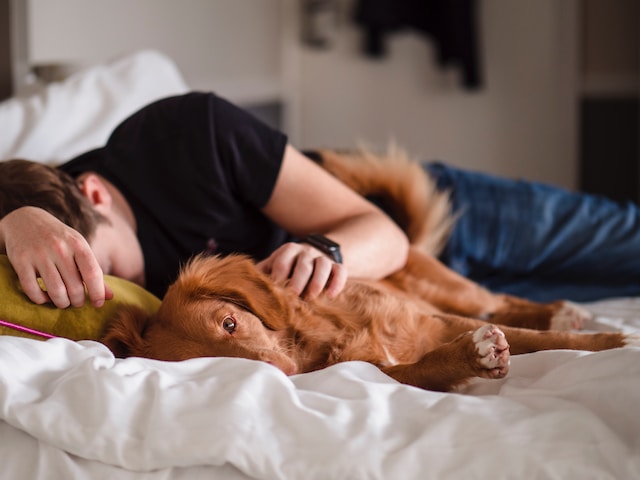Crate training is a common method used to teach dogs good behavior and obedience. It provides them with a safe and secure environment that mimics their natural den instincts.
Crate training can be an important tool for pet owners, especially for puppies or dogs that need to be trained or managed in certain situations, one of which is sleeping and barking at night.
Naturally, it can be frustrating when your crate trained dog suddenly starts barking at night, after all the effort you’ve invested into his training and the sense of achievement it gives to do it successfully, especially for new dog parents.
Therefore the logical thing to do before thinking about how to stop a dog from barking at night is to know why is barking in the first place, In this article, we will explore the reasons why your crate trained dog may suddenly start barking at night and what you can do about it.
Why is Your Crate Trained Dog Suddenly Barking at Night?
There are multiple reasons why a crate trained dog would suddenly start barking at night and here is a list of the most common ones you can explore.
Separation Anxiety
Separation anxiety is a common cause of nighttime barking in crate trained dogs. When dogs are crate trained, they become accustomed to being in a safe and secure environment. However, if they are suddenly left alone for longer periods, they may become anxious and start barking. To help alleviate separation anxiety, try gradually increasing the time your dog spends in their crate, provide plenty of toys, and make sure they get plenty of exercise before bedtime.
Physical Discomfort
Another possible cause of nighttime barking in crate trained dogs is physical discomfort. If your dog is experiencing pain or discomfort, they may bark to let you know. Check to make sure their crate is comfortable, with plenty of soft bedding and enough room to move around. Additionally, if your dog has a medical condition or injury, consult with your veterinarian to ensure they receive the proper treatment.
Environmental Triggers
Environmental triggers can also cause nighttime barking in crate trained dogs. This includes loud noises such as thunderstorms, fireworks, or traffic. To help your dog feel more comfortable, try providing a calming environment, such as white noise or a fan. Additionally, consider using a thunder vest or calming supplements to help your dog feel more relaxed and secure.
Lack of Exercise
Dogs that don’t get enough exercise may become restless and anxious, leading to nighttime barking. Make sure your dog is getting enough exercise during the day to help them feel tired and ready for sleep. Consider taking your dog for a walk before bedtime or providing them with interactive toys to keep them mentally stimulated.
Behavioral Issues
Finally, behavioral issues may also contribute to nighttime barking in crate trained dogs. This includes issues such as fear, aggression, or territorial behavior. If you suspect your dog is experiencing behavioral issues, consult with a professional dog trainer or behaviorist to help address the issue.
Is it normal for puppies to bark at night?
Yes, it is normal for puppies to bark at night. Puppies bark for various reasons, including alerting their owners to potential danger, expressing boredom or anxiety, or simply wanting attention.
In some cases, puppies may bark more frequently at night because they are feeling anxious or lonely. This is especially true if they have recently been separated from their littermates or if they are in a new environment.
it is normal for puppies to bark at night, even if they are crate trained. Crate training is a commonly used method to train puppies to sleep through the night without causing any trouble or accidents. However, it is important to understand that puppies can still feel anxious or lonely, even if they are in a crate.
If your puppy is barking excessively at night, it could be a sign that they are not comfortable with their crate. This can happen if the crate is too small, uncomfortable, or if it is located in a noisy or isolated area. In some cases, your puppy may just need some time to adjust to their new sleeping environment.
It’s important to remember that puppies need time to develop good sleep habits, just like humans do. If your puppy is barking at night, it’s important to address the underlying cause and provide them with the support and training they need to develop good sleep habits. This may involve providing them with a comfortable and secure sleeping environment, providing them with plenty of exercise and mental stimulation during the day, and working with a professional trainer to address any behavioral issues.
How to stop a crate trained dog suddenly barking at night?

Barking can disrupt your sleep, your neighbors’ sleep, and cause a general feeling of unrest in your household. Luckily, there are several steps you can take to stop your crate trained dog from barking at night.
we’ll explore some effective tips on how to make a crate trained dog suddenly barking at night stop. Let’s get started.
Understand the Root Cause of the Barking
The first step to stop your crate trained dog from barking at night is to understand the reason behind the barking. Some common reasons why dogs bark at night include separation anxiety, fear, hunger, or the need to use the bathroom. Once you understand the root cause, you can take the necessary steps to address the issue.
Check for Physical or Emotional Needs
Before addressing your dog’s barking behavior, it’s essential to ensure they don’t have any physical or emotional needs that are not being met.
Some common reasons why a dog may bark at night include hunger, thirst, needing to go potty, or feeling anxious or scared. Make sure to provide your dog with food, water, a potty break, and a comforting environment to alleviate any underlying causes of the barking.
Establish a Consistent Bedtime Routine
Dogs thrive on routine, so establishing a consistent bedtime routine can be incredibly helpful in reducing barking behavior at night. This routine could include a calming activity such as a walk, playtime, or snuggle time with you.
Establishing a predictable bedtime routine helps your dog feel secure and relaxed, which can lead to better sleep and less barking.
Provide Comfortable Sleeping Conditions

Your dog’s crate should be comfortable and cozy. Make sure the crate is the right size for your dog and that they have a comfortable bed to sleep on. Providing your dog with comfortable sleeping conditions can help them relax and feel less anxious, reducing the chances of barking at night.
Increase Exercise and Playtime During the Day
A tired dog is a happy dog, and the more exercise and playtime your dog gets during the day, the less likely they will be to bark at night. Make sure to take your dog on regular walks, engage in playtime, and provide mental stimulation to keep them happy and tired.
Avoid Feeding Your Dog Right Before Bedtime
Feeding your dog right before bedtime can cause digestive issues, leading to discomfort and barking at night. Try to feed your dog at least 3-4 hours before bedtime to ensure they have enough time to digest their food.
Use Positive Reinforcement Training
Positive reinforcement training is a proven method to reduce unwanted behavior in dogs, including barking at night. When your dog is quiet, reward them with treats, praise, and attention. Over time, your dog will learn that being quiet at night leads to positive outcomes, and the barking behavior will decrease.
Consider Using a White Noise Machine
If your dog is barking at night due to outside noise, such as passing cars or neighbors, consider using a white noise machine in your home. This can help drown out external noise and create a peaceful sleeping environment for your dog.
Seek Professional Help
If your dog’s barking at night persists despite your best efforts, it might be time to seek professional help. A veterinarian or dog trainer can help you identify the root cause of the barking and provide you with effective solutions to address the issue.
What does the US law say about barking dogs at night?
The laws about barking dogs at night in the US vary by state and local jurisdiction. In general, there are noise ordinances in place that prohibit excessive barking or other noise that can disturb the peace and quiet of the community.
Most ordinances define “excessive barking” as continuous barking for a certain period of time, such as 10 minutes or more, or intermittent barking that goes on for an extended period of time, such as an hour or more. Violations of these ordinances can result in fines or other penalties for the dog’s owner.
Some local jurisdictions may also have specific rules regarding barking dogs at night, such as requiring dogs to be kept indoors after a certain time, or limiting the hours during which dogs can be outside.
If you are experiencing issues with a barking dog in your neighborhood, it’s a good idea to contact your local animal control or law enforcement agency to report the issue and find out what steps can be taken to address the problem.
Conclusion
If your crate trained dog is suddenly barking at night, it’s important to identify the underlying cause and take steps to address it.
By understanding the possible reasons for nighttime barking, you can help your dog feel more comfortable and secure, and ensure a peaceful night’s sleep for both you and your furry friend.
Remember to provide plenty of exercise, a comfortable crate, and a calming environment, and seek professional help if necessary.






